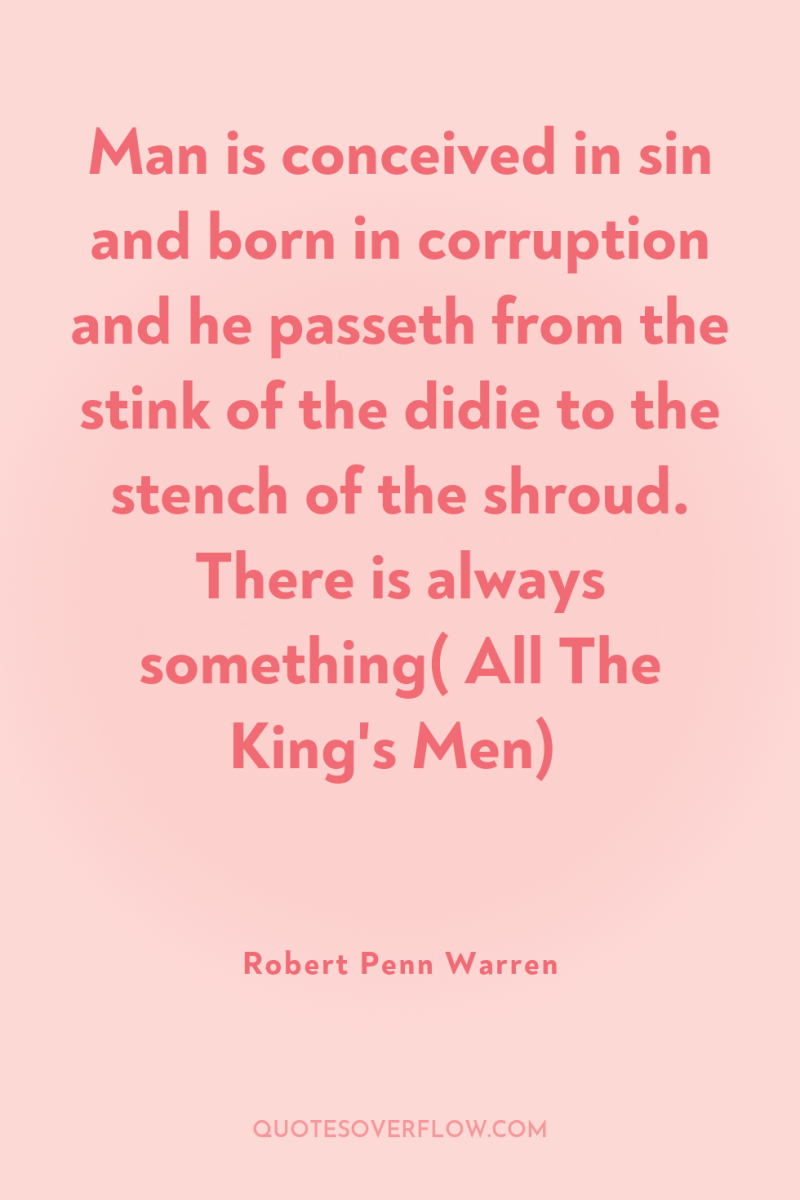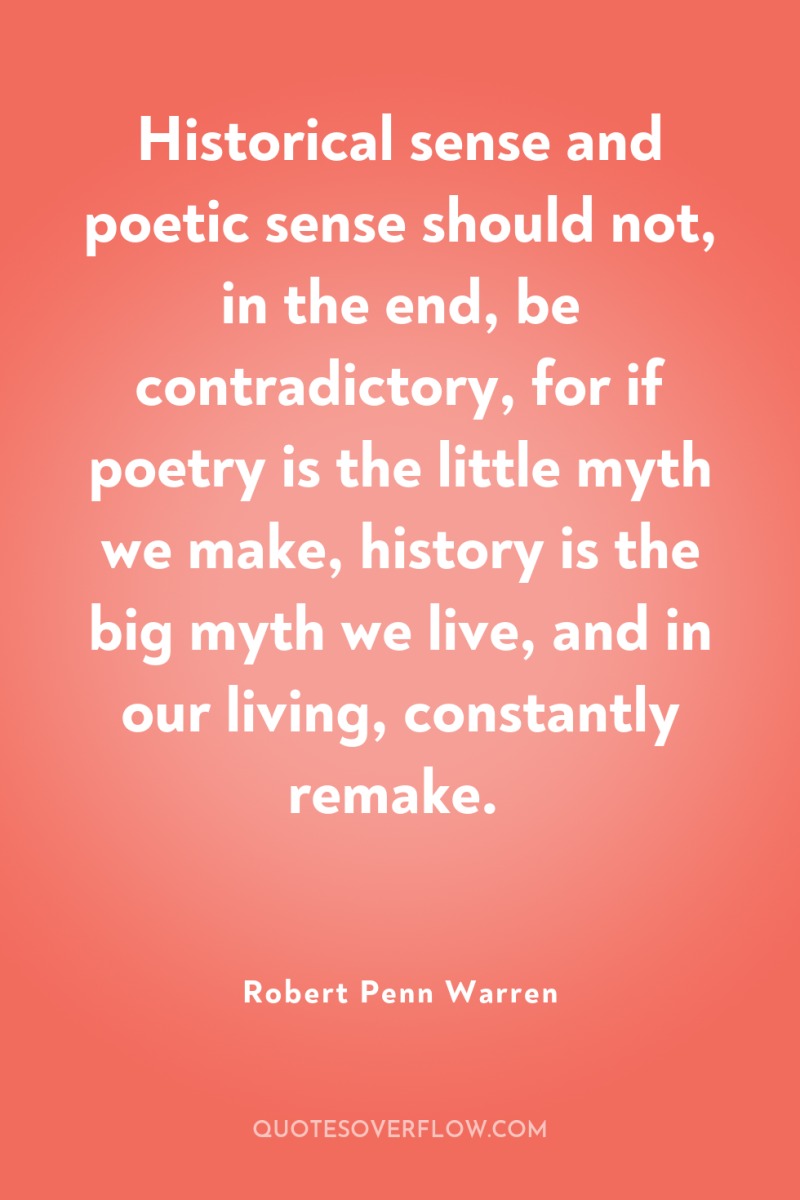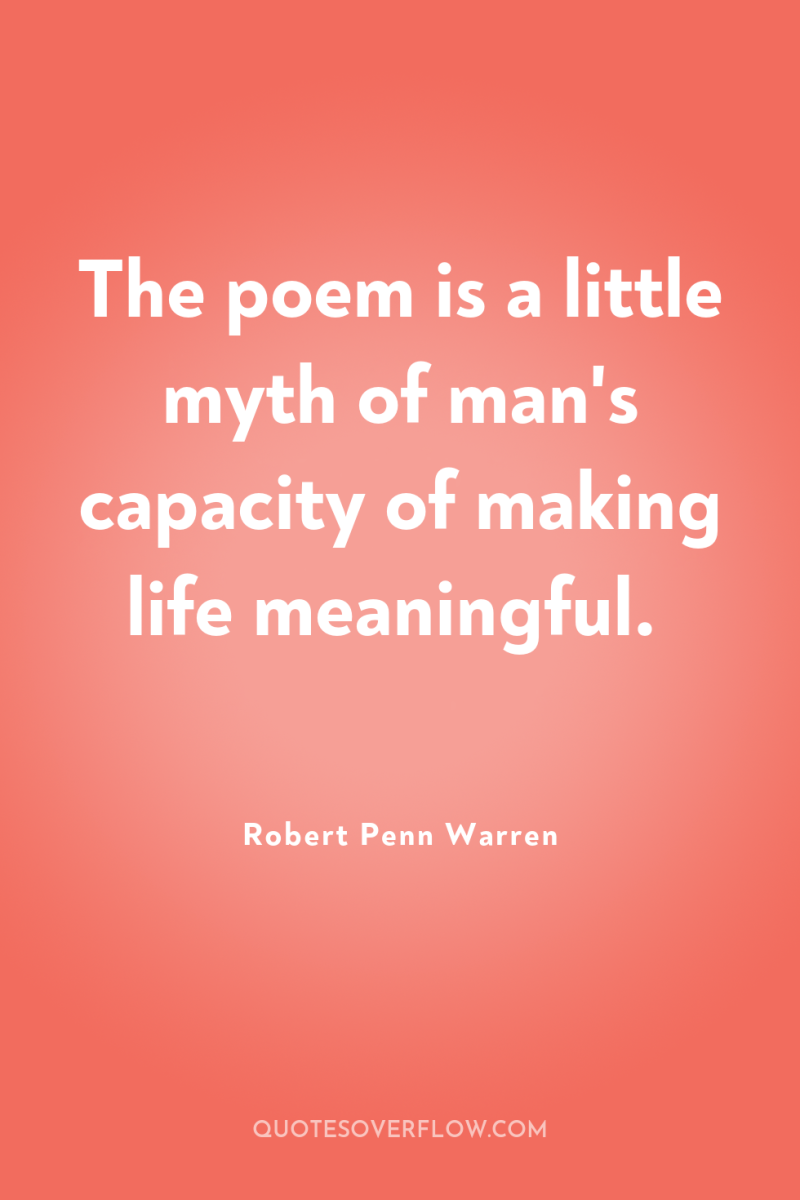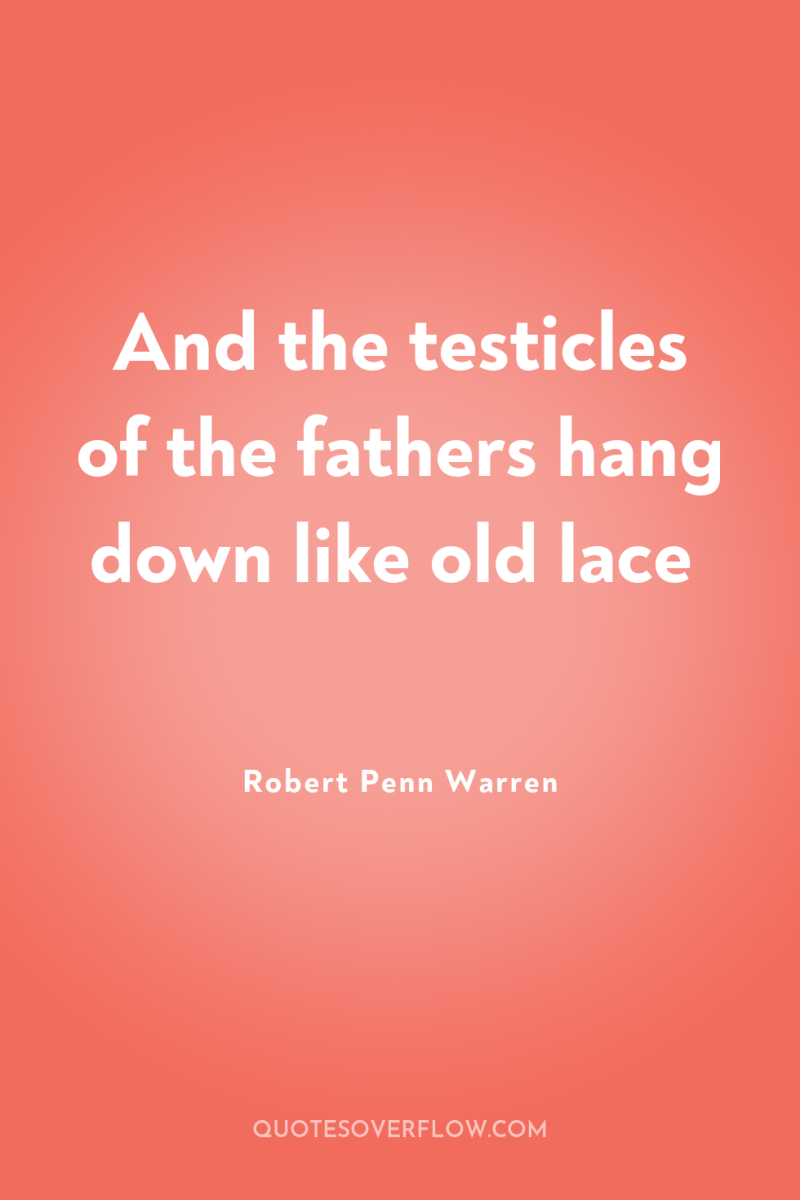
1
Man is conceived in sin and born in corruption and he passeth from the stink of the didie to the stench of the shroud. There is always something( All The King's Men)Robert Penn Warren

2
Historical sense and poetic sense should not, in the end, be contradictory, for if poetry is the little myth we make, history is the big myth we live, and in our living, constantly remake.Robert Penn Warren

3
The poem is a little myth of man's capacity of making life meaningful.Robert Penn Warren

4
BeautyIs the fume-track of necessity. This thought Is therapeutic. If, after several Applications, you do not find Relief, consult your family physicianRobert Penn Warren

5
And the testicles of the fathers hang down like old laceRobert Penn Warren

6
Real writers are those who want to write, need to write, have to write.Robert Penn Warren
7
I got an image in my head that never got out. We see a great many things and can remember a great many things, but that is different. We get very few of the true images in our heads of the kind I am talking about, the kind that become more and more vivid for us as if the passage of the years did not obscure their reality but, year by year, drew off another veil to expose a meaning which we had only dimly surmised at first. Very probably the last veil will not be removed, for there are not enough years, but the brightness of the image increases and our conviction increases that the brightness is meaning, or the legend of meaning, and without the image our lives would be nothing except an old piece of film rolled on a spool and thrown into a desk drawer among the unanswered letters. .Robert Penn Warren
8
They say you are not you except in terms of relation to other people. If there weren't any other people there wouldn't be any you because what you do, which is what you are, only has meaning in relation to other people.Robert Penn Warren
9
You live through .. . that little piece of time that is yours, but that piece of time is not only your own life, it is the summing-up of all the other lives that are simultaneous with yours. It is, in other words, History, and what you are is an expression of History.Robert Penn Warren

10
If you want him to do it, you've got to change the picture of the world inside his head.Robert Penn Warren
11
The Friend of Your Youth is the only friend you will ever have, for he does not really see you. He sees in his mind a face that does not exist anymore, speaks a name — Spike, Bud, Snip, Red, Rusty, Jack, Dave — which belongs to that now nonexistent face but which by some inane doddering confusion of the universe is for the moment attached to a not happily met and boring stranger. But he humors the drooling doddering confusion of the universe and continues to address politely that dull stranger by the name which properly belongs to the boy face and to the time when the boy voice called thinly across the late afternoon water or murmured by a campfire at night or in the middle of a crowded street said, “Gee, listen to this—’ On Wenlock Edge the wood’s in trouble; His forest fleece the Wrekin heaves—’” The Friend of Your Youth is your friend because he does not see you anymore. And perhaps he never saw you. What he saw was simply part of the furniture of the wonderful opening world. Friendship was something he suddenly discovered and had to give away as a recognition of and payment for the breathlessly opening world which momently divulged itself like a moonflower. It didn’t matter a damn to whom he gave it, for the fact of giving was what mattered, and if you happened to be handy you were automatically endowed with all the appropriate attributes of a friend and forever after your reality is irrelevant. The Friend of Your Youth is the only friend you will ever have, for he hasn’t the slightest concern with calculating his interest or your virtue. He doesn’t give a damn, for the moment, about Getting Ahead or Needs Must Admiring the Best, the two official criteria in adult friendships, and when the boring stranger appears, he puts out his hand and smiles (not really seeing your face) and speaks your name (which doesn’t really belong to your face), saying, “Well, Jack, damned glad you came, come on in, boy! .Robert Penn Warren
12
A civil war is, may we say, the prototype of all war, for in the persons of fellow citizens who happen to be the enemy we meet again, with the old ambivalence of love and hate and with all the old guilts, the blood brothers of our childhood. In a civil war — especially in one such as this when the nation shares deep and significant convictions and is not a mere handbasket of factions huddled arbitrarily together by historical happen-so — all the self-divisions of conflicts within individuals become a series of mirrors in which the plight of the country is reflected, and the self-division of the country a great mirror in which the individual may see imaged his own deep conflicts, not only the conflicts of political loyalties, but those more profoundly personal.Robert Penn Warren
13
Let us leave in suspension such debates about the economic costs of the War and look at another kind of cost, a kind more subtle, pervasive, and continuing, a kind that conditions in a thousand ways the temper of American life today. This cost is psychological, and it is, of course, different for the winner and the loser.Robert Penn Warren
14
During all that time I didn't see Willie. I didn't see him again until he announced in the Democratic primary in 1930. But it wasn't a primary. It was hell among the yearlings and the Charge of the Light Brigade and Saturday night in the back room of Casey's saloon rolled into one, and when the dust cleared away not a picture still hung on the walls. And there wasn't any Democratic party. There was just Willie, with his hair in his eyes and his shirt sticking to his stomach with sweat. And he had a meat ax in his hand and was screaming for blood. In the background of the picture, under a purplish tumbled sky flecked with sinister white like driven foam, flanking Willie, one on each side, were two figures, Sadie Burke and a tallish, stooped, slow-spoken man with a sad, tanned face and what they call the eyes of a dreamer. The man was Hugh Miller, Harvard Law School, Lafayette Escadrille, Croix de Guerre, clean hands, pure heart, and no political past. He was a fellow who had sat still for years, and then somebody (Willie Stark) handed him a baseball bat and he felt his fingers close on the tape. He was a man and was Attorney General. And Sadie Burke was just Sadie Burke.Over the brow of the hill, there were, of course, some other people. There were, for instance, certain gentlemen who had been devoted to Joe Harrison, but who, when they discovered there wasn't going to be any more Joe Harrison politically speaking, had had to hunt up a new friend. The new friend happened to be Willie. He was the only place for them to go. They figured they would sign on with Willie and grow up with the country. Willie signed them on all right, and as a result got quite a few votes not of the wool-hat and cocklebur variety. After a while Willie even signed on Tiny Duffy, who became Highway Commissioner and, later, Lieutenant Governor in Willie's last term. I used to wonder why Willie kept him around. Sometimes I used to ask the Boss, "What do you keep that lunk-head for?" Sometimes he would just laugh and say nothing. Sometimes he would say, "Hell, somebody's got to be Lieutenant Governor, and they all look alike." But once he said: "I keep him because he reminds me of something."" What?"" Something I don't ever want to forget, " he said." What's that?"" That when they come to you sweet talking you better not listen to anything they say. I don't aim to forget that." So that was it. Tiny was the fellow who had come in a big automobile and had talked sweet to Willie back when Willie was a little country lawyer.Robert Penn Warren
15
The struggle for power conducted along logical lines is much more likely to occur in smoke-filled rooms than at the polls. The party system is a grid, a filter, a meat chopper, through which issues are processed for the consuming public. The Civil War confirmed our preference for this arrangement. We like the fog of politics, with the occasional drama of the flash of a lightning bolt that, happily, is usually nothing more than a near miss. .Robert Penn Warren
16
That old unionism was, however, very different from the kind we live with now. We do not live with an ideal, sometimes on the defensive, of union. We live with the overriding, overwhelming fact, a fact so technologically, economically, and politically validated that we usually forget to ask how fully this fact represents a true community, the spiritually significant communion which the old romantic unionism had envisaged.Robert Penn Warren
17
..by the time we understand the pattern we are in, the definition we are making for ourselves, it's too late to break out of the box. We can only live in terms of the definition, like the prisoner in the cage in which he cannot lie or stand or sit, hung up in justice to be viewed by the populace. Yet the definition we have made of ourselves is ourselves. To break out of it, we must make a new self. But how can the self make a new self when the selfness which it is, is the only substance from which the new self can be made? .Robert Penn Warren
18
The lack of a sense of history is the damnation of the modern world.Robert Penn Warren
19
It is hard to remember.”“ Remember what?”“ All that goes into the making of any one moment we live. There are things one must try to remember. Do you know what is the hardest thing to remember?”“ No, ” Adam said.“ Well, I’ll tell you, my son, ” Aaron Blaustein said. “The hardest thing to remember is that other men are men.” He leaned to set his cup down. “But that, ” he said, “is the only way you can be a man yourself. Can be anything.Robert Penn Warren
20
Furthermore, a society with no sense of the past, with no sense of the human role as significant not merely in experiencing history but in creating it can have no sense of destiny. And what kind of society is it that has no sense of destiny and no sense of self? That has no need or will to measure itself by the record of human achievement and the range of human endowment? And here we may pause to ask what our society measures itself by. Is it only by the ability to gratify immediate appetites, capacity for consumption, and the GNP? .Robert Penn Warren
21
But, the stultifying lingo aside, the question I raise is a vital one for us all, we are all stuck with trying to find the meaning of our lives, and the only thing we have to work on, or with, is our past.Robert Penn Warren
22
I know nothing I’m doing is important, ' he said. 'Sure, I’m just a waste product of history. Maybe nothing I’m doing is even real, after all. But I was born right here, in this old house, and I look out the window and know what I’m seeing, and I know some people I like to be with, and I like what I do all day long, and maybe that’s all that realness is, anywayRobert Penn Warren
23
We can grant, too, that for social problems to be diagnosed, some detachment from society is necessary… But social problems are rarely to be solved by men totally outside of society — certainly not by men not merely outside of a particular society but outside of the very concept of society. For if all institutions are “dirty, ” why really bother to amend them? Destruction is simpler, purer, more logical, and certainly more exciting. Conscience without responsibility — this is truly the last infirmity of noble mind.Robert Penn Warren
24
For example. But I cannot give you an example. It was not so much any one example, any one event, which I recollected which was important, but the flow, the texture of the events, for meaning is never in the event but in the motion through event. Otherwise we could isolate an instant in the event and say that this is the event itself. The meaning. But we cannot do that. For it is the motion which is important. And I was moving. I was moving West at seventy-five miles an hour, through a blur of million-dollar landscape and heroic history, and I was moving back through time into my memory. They say the drowning man re-lives his life as he drowns. Well, I was not drowning in water, but I was drowning in West. I drowned westward through the hot brass days and black velvet nights. It took me seventy-eight hours to drown. For my body to sink down to the very bottom of West and lie in the motionless ooze of History, naked on a hotel bed in Long Beach, California.Robert Penn Warren
25
If you could not accept the past and its burden there was no future, for without one there cannot be the other.Robert Penn Warren
26
Reality is not a function of the event as event, but of the relationship of that event to past, and future, events.Robert Penn Warren
27
For West is where we all plan to go some day. It is where you go when the land gives out and the old-field pines encroach. It is where you go when you get the letter saying: Flee, all is discovered. It is where you go when you look down at the blade in your hand and the blood on it. It is where you go when you are told that you are a bubble on the tide of empire. It is where you go when you hear that thar's gold in them-thar hills. It is where you go to grow up with the country. It is where you go to spend your old age. Or it is just where you go.Robert Penn Warren
28
I was headed out down a long bone-white road, straight as a string and smooth as glass and glittering and wavering in the heat and humming under the tires like a plucked nerve. I was doing seventy-five but I never seemed to catch up with the pool which seemed to be over the road just this side of the horizon. Then, after a while, the sun was in my eyes, for I was driving west. So I pulled the sun screen down and squinted and put the throttle to the floor. And kept on moving west. For West is where we all plan to go some day. It is where you go when the land gives out and the old-field pines encroach. It is where you go when you get the letter saying: Flee, all is discovered. It is where you go when you look down at the blade in your hand and the blood on it. It is where you go when you are told that you are a bubble on the tide of empire. It is where you go when you hear that thar's gold in them-thar hills. It is where you go to grow up with the country. It is where you go to spend your old age. Or it is just where you go. It was just where I went.Robert Penn Warren
29
He thought of night coming on. He thought of the loneliness of tonight, this first night in the ground. This, he thought, was the moment when the dead must first feel truly alone. This was the moment when the dead, in loneliness, feel the first stirrings of the long penance of decay. This was the moment when the dead realize the truth: This is it, it will never be different. To be dead, he thought, that was to know that nothing would ever be different.Robert Penn Warren
30
.. . for meaning is never in the event but in the motion through event. Otherwise we could isolate an instant in the event and say that this is the event itself. The meaning. But we cannot do that. For it is the motion which is important.Robert Penn Warren
31
There was the bulge and the glitter, and there was the cold grip way down in the stomach as though somebody had laid hold of something in there, in the dark which is you, with a cold hand in a cold rubber glove. It was like the second when you come home late at night and see the yellow envelope of the telegram sticking out from under your door and you lean and pick it up, but don't open it yet, not for a second. While you stand there in the hall, with the envelope in your hand, you feel there's an eye on you, a great big eye looking straight at you from miles and dark and through walls and houses and through your coat and vest and hide and sees you huddled up way inside, in the dark which is you, inside yourself, like a clammy, sad little fetus you carry around inside yourself. The eye knows what's in the envelope, and it is watching you to see you when you open it and know, too. But the clammy, sad little fetus which is you way down in the dark which is you too lifts up its sad little face and its eyes are blind, and it shivers cold inside you for it doesn't want to know what is in that envelope. It wants to lie in the dark and not know, and be warm in its not-knowing.Robert Penn Warren
32
The best luck always happens to people who don't need it.Robert Penn Warren
33
Politics is action and all action is but a flaw in the perfection of inaction, which is peace, just as all being is but a flaw in the perfection of nonbeing. Which is God. For if God is perfection and the only perfection is in nonbeing, then God is nonbeing. Then God is nothing. Nothing can give no basis for the criticism of Thing in its thingness. Then where do you get anything to say? Then where do you get off? .Robert Penn Warren
34
When you get born your father and mother lost something out of themselves, and they are going to bust a ham trying to get it back, and you are it. They know they can't get it all back but they will get as big a chunk out of you as they can.Robert Penn Warren
35
He would get up and go out into a world which seemed very unfamiliar, but with a tantalizing unfamiliarity like the world of boyhood to which an old man returns.Robert Penn Warren
36
You meet somebody at the seashore on a vacation and have a wonderful time together. Or in a corner at a party, while the glasses clink and somebody beats on a piano, you talk with a stranger whose mind seems to whet and sharpen your own and with whom a wonderful new vista of ideas is spied. Or you share some intense or painful experience with somebody, and discover a deep communion. Then afterward you are sure that when you meet again, the gay companion will give you the old gaiety, the brilliant stranger will stir your mind from its torpor, the sympathetic friend will solace you with the old communion of spirit. But something happens, or almost always happens, to the gaiety, the brilliance, the communion. You remember the individual words from the old language you spoke together , but you have forgotten the grammar. You remember the steps of the dance, but the music isn’t playing any more. So there you are.Robert Penn Warren
37
A man goes away from his home and it is in him to do it. He lies in strange beds in the dark, and the wind is different in the trees. He walks in the street and there are the faces in front of his eyes, but there are no names for the faces. the voices he hears are not the voices he carried away in his ears a long time back when he went away. The voices he hears are loud. they are so loud he does not hear for a long time at a stretch those voices he carried away in his ears. but there comes a minute when it is quiet and he can hear those voices he carried away in his ears a long time back. He can make out what they say, and they say: Come back. They say: Come back, boy. So he comes back. .Robert Penn Warren
38
There ain't anything worth doing a man can do and keep his dignity. Can you figure out a single thing you really please- God like to do you can do and keep your dignity? The human frame just ain't built that way.Robert Penn Warren
39
Sometimes sleep gets to be a serious and complete thing. You stop going to sleep in order that you may be able to get up, but get up in order that you may be able to go back to sleep.Robert Penn Warren
40
(The law) is like a single-bed blanket on a double bed and three folks in the bed and a cold night. There ain’t ever enough blanket to cover the case, no matter how much pulling and hauling, and somebody is always going to nigh catch pneumonia. Hell, the law is like the pants you bought last year for a growing boy, but it is always this year and the seams are popped and the shankbone’s to the breeze. The law is always too short and too tight for growing humankind. .Robert Penn Warren
41
No, the Boss corrected, I'm not a lawyer. I know some law.. but I'm not a lawyer. That's why I can see what the law is like. It's like a single-bed blanket on a double bed and three folks in the bed and a cold night. There ain't ever enough blanket to cover the case, no matter how much pulling and hauling, and somebody is always going to nigh catch pneumonia. Hell, the law is like the pants you bought last year for a growing boy, but it is always this year and the seams are popped and the shankbone's to the breeze. The law is always too short and too tight for growing humankind. The best you can do is do something and then make up some law to fit and by the time that law gets on the books you would have done something different.Robert Penn Warren
42
For what blessing may a man hope for but An immortality in The loving vigilance of death.Robert Penn Warren
43
So there are two you's, the one you create by loving and the one the beloved creates by loving you. The farther those two you's are apart the more the world grinds and grudges on its axis. But if you loved and were loved perfectly then there wouldn't be any difference between the two you's or any distance between them. They would coincide perfectly, there would be perfect focus, as when a stereoscope gets the twin images on the card into perfect alignment. .Robert Penn Warren
44
But I don't know, in the end, what deserts, chasms, achievements, virtues, and beauties have to do with love. We can love for so many different, and paradoxical, qualities in the object of our love--for strength or for weakness, for beauty or for ugliness, for gaiety or for sadness, for sweetness or for bitterness, for goodness or for wickedness, for need or for impervious independence. Then, if we wonder from what secret springs in ourselves gushes our love, our poor brain goes giddy from speculation, and we wonder what is all meaning and worth. Is it our own need that makes us lean toward and wish to succor need, or is it our strength? What way would our strength, if we had it, incline our heart? Do we give love in order to receive love, and even in the transport or endearment carry the usurer's tight-lipped and secret calculation, unacknowledged even by ourselves? Or do we give with an arrogance after all, a passion for self-definition? Or do we simply want a hand, any hand, a human object, to clutch in the dark on the blanket, and fear lies behind everything? Do we want happiness, or is it pain, pain as the index of reality, that we, in the chamber of our heart, want? Oh, if I knew the answer, perhaps then I could feel free. .Robert Penn Warren
45
You are dehydrated, " I said. "The result of alcohol taken in excess. But that is the only way to take it. It is the only way to do a man any good.Robert Penn Warren
46
So I pulled the sun screen down and squinted and put the throttle to the floor. And kept on moving west. For West is where we all plan to go some day. It is where you go when the land gives out and the oldfield pines encroach. It is where you go when you get the letter saying: Flee, all is discovered. IT is where you go when you look down at the blade in your hand and see the blood on it. It is where you go when you are told that you are a bubble on the tide of empire. It is where you go when you hear that thar's gold in them-thar hills. It is where you go to grow up with the country. It is where you go to spend your old age. Or it is just where you go.Robert Penn Warren
47
In the last analysis, be always of whatever truth you would live. For fire flames but in the heart of a colder fire. All voice is but echo caught from a soundless voice. Height is not deprivation of valley, nor defect of desire, But defines, for the fortunate, that joy in which all joys should rejoice.Robert Penn Warren
48
But for the present I would lie there and know I didn't have to get up, and feel the holy emptiness and blessed fatigue of a saint after the dark night of the soul. For God and Nothing have a lot in common. You look either one of Them straight in the eye for a second and the immediate effect on the human constitution is the same.Robert Penn Warren
49
The poem is a little myth of man's capacity of making his life meaningful. And in the end the poem is not a thing we see - it is rather a light by which we may see - and what we see is life.Robert Penn Warren
50
What is man but his passion?Robert Penn Warren
51
For what is a poem but a hazardous attempt at self-understanding: it is the deepest part of autobiography.Robert Penn Warren
52
How do poems grow? They grow out of your life.Robert Penn Warren
53
The poem is a little myth of man's capacity of making life meaningful. And in the end, the poem is not a thing we see-it is, rather, a light by which we may see-and what we see is life.Robert Penn Warren